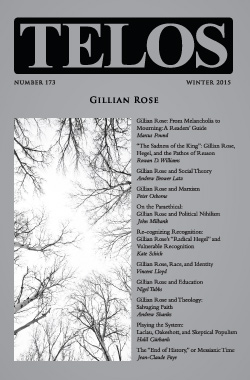Andrew Shanks’s “Gillian Rose and Social Theory” appears in Telos 173 (Winter 2015). Read the full version at the Telos Online website, or purchase a print copy of the issue in our store.
 Gillian Rose began as a sympathetic interpreter of Adorno. This essay considers the abiding strength of Adorno’s thought, from her point of view, by contrast for instance with that of Heidegger; but also the rationale of her eventual move beyond Adorno, and back to Hegel.
Gillian Rose began as a sympathetic interpreter of Adorno. This essay considers the abiding strength of Adorno’s thought, from her point of view, by contrast for instance with that of Heidegger; but also the rationale of her eventual move beyond Adorno, and back to Hegel.
Fundamentally at issue, in this move, is the Hegelian notion of “Absolute Knowing,” as a systematic re-opening of the most purely rationalistic philosophy, toward theology. That is, the sense in which it represents an ideal “salvage” strategy, with regard to religion: neither over-reductionist in the manner of Kant, or of Feuerbach, nor inadequately critical in the manner of Schleiermacher; but, rather, an approach precisely focused on the ineradicable ambiguity of all religious utterance—as a potential medium for “Spirit”—even whilst fully acknowledging religion’s unsurpassable potential virtues as a non-elitist mode of communication. Rose, it is argued, quite rightly sees beyond Adorno’s caricatural misreading of Hegelian grand-narrative “theodicy”: which is by no means, in fact, the intrinsically de-sensitizing mode of ideology he supposes it to be, but is, instead, a therapeutically “comedic” impulse, akin to Nietzschean amor fati, combined with a (not at all Nietzschean) concern for effective cosmopolitan solidarity-building.
Rose never, herself, quite crossed over into the proper domain of theology. Neither, indeed, did Hegel. But here the question is raised, what such a crossover might, after all, look like. Perhaps, it is suggested: a renewed form of “mystical theology“?
Andrew Shanks is a retired Church of England priest, Canon Emeritus of Manchester Cathedral.



